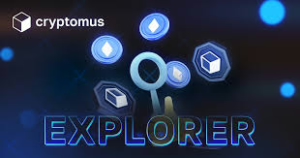Imagine stepping into a digital realm where your online experiences are not just about browsing but engaging with an entirely new universe built on decentralisation.
A crypto browser is not your typical internet navigator; it’s specifically crafted to interact with decentralised applications, known as dApps, that lie at the heart of the Web 3.0 ecosystem. Unlike traditional browsers that connect you to centralised websites, these specialised tools offer unique features designed for managing cryptocurrencies and digital assets.

With integrated wallets, users can easily store, send, and receive cryptocurrencies like Bitcoin and Ethereum directly from their browsing experience. No more juggling multiple apps or extensions; everything you need is elegantly built into the interface.
The allure doesn’t stop there. These browsers empower users to seamlessly engage with decentralised finance platforms and explore the vibrant world of non-fungible tokens (NFTs). Enhanced security measures are baked in through advanced cryptographic protocols, ensuring privacy in every transaction.
How do crypto browsers work?
In essence, a crypto browser embodies the spirit of Web 3.0: empowering users while championing decentralisation and user control over personal data.
Crypto and Web 3 browsers are designed to seamlessly integrate with blockchain technology, allowing users to interact directly with the decentralised web. At their core, they incorporate blockchain networks, providing a gateway into a digital realm free from traditional server dependency.

One of the standout features is the built-in wallet. This secure digital wallet enables users to store and manage their cryptocurrencies and digital assets like NFTs with great ease. Transactions are not just simple; they’re designed for direct engagement with various decentralised applications (dApps) across different blockchain platforms.
Users can execute intelligent contracts effortlessly—these self-executing agreements are coded onto the blockchain, ensuring accuracy and security. With enhanced security measures based on cryptographic techniques, these browsers protect user data and transactions from potential exploits.
Operating within a decentralised framework significantly reduces reliance on central authorities. Consequently, users gain improved control over their digital identities and assets. Privacy is paramount, as none of the sensitive user information is stored centrally, fostering a more secure online experience in this new frontier of the internet.
How to choose the right crypto browser
Selecting the ideal crypto or Web 3.0 browser is a journey filled with important considerations. To guide you through this process, let’s explore the essential elements to keep in mind.

First and foremost, security features should be at the top of your list. It’s crucial to investigate what protective measures the browser offers—look for integrated wallets, robust encryption techniques, and safeguards against malware and phishing threats.
Next, consider blockchain compatibility. You’ll want a browser that seamlessly supports various blockchain networks and protocols, enabling you to interact with a wide array of decentralised applications (dApps) and cryptocurrencies.
User experience plays a significant role as well. A browser with an intuitive design will make it easier for those new to crypto and Web 3.0 to navigate.
Don’t overlook wallet functionality, either. Assess how user-friendly the built-in wallet is, whether it accommodates different cryptocurrencies, and what backup or recovery options are available if you need them.
Privacy is another critical aspect to consider. Examine how the browser handles user data—features like private browsing modes, data encryption practices, and policies on data collection can offer peace of mind as you explore this digital landscape.
Performance matters, too. Consider how quickly the browser loads pages and processes complex dApps or blockchain services—speed can significantly enhance your overall experience.
Developer support and community engagement are also worth investigating. Strong community backing, along with frequent updates, can indicate a reliable browser that continues to improve over time.
Moreover, check for extension and plugin compatibility; having access to essential tools can significantly expand your browsing capabilities.
It’s also wise to research reputation through reviews from users and experts alike. This feedback can provide valuable insights into any potential pitfalls or standout features of the browser you’re considering.

Lastly, ensure that the browser works well across all your devices and operating systems for a smooth transition between platforms. And don’t forget about customer support; having responsive assistance available when issues arise is vital for navigating transactions or interacting with dApps effectively.
By considering these factors during your selection process, you’ll be well-equipped to find a crypto or Web 3.0 browser that perfectly meets your needs.
Maxthon and the Blockchain Revolution
In an era where digital interactions are becoming increasingly complex, Maxthon is leading the charge towards a browsing experience rooted in blockchain technology. The team at Maxthon recognises the revolutionary potential of blockchain and is committed to reshaping how users engage with this evolving digital world. They are introducing innovative solutions such as Vbox, a tool designed to manage blockchain identities; NBdomain, a pioneering system for blockchain-based domains; and Vpoint wallet, which streamlines payments for BSV applications.

Let’s take a closer look at Vbox. Its primary mission is to address a critical issue that many internet users face today: the sheer volume of online identities they must maintain. In most cases, these identities are controlled by various corporations rather than by the individuals who created them. This corporate dominance raises significant concerns regarding privacy and security since sensitive user data remains in the hands of these companies. Additionally, managing multiple accounts across different platforms often leads to what many refer to as password fatigue.
The silver lining in this scenario is that blockchain technology offers a promising solution. With Vbox, Maxthon enables users to create their own secure identities on the blockchain, granting them enhanced privacy and control over their online presence. As our lives become more intertwined with digital platforms—be it chat services, social media like Twitter, or email accounts—it’s essential to understand that ownership of these profiles often resides with service providers instead of users themselves.
This imbalance creates vulnerabilities around privacy and security; users need absolute authority over their accounts since companies can deactivate them at any moment while retaining most of the associated data. Moreover, juggling countless passwords for different services can be an exasperating experience.
However, Maxthon’s Vbox platform allows individuals to reclaim their online identity in a way that empowers them like never before. By harnessing the capabilities of blockchain technology, they can navigate this intricate digital landscape with confidence and ease.
